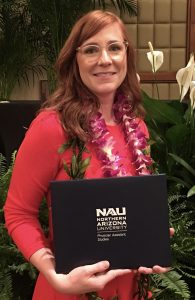Tips for New PAs on How to Grow Your Role at Work
Early Career PA Commission Shares Tips
May 8, 2020
By Allyson Hamacher, PA-C, and Jack Ward, PA-C
AAPA’s Early Career PA Commission provides both staff and constituent organizations invaluable perspective and insight into what it’s like to be a newly practicing PA today. Two members of the Early Career PA Commission, Allyson Hamacher, PA-C, who practices neurology in Phoenix, Arizona, and Jack Ward, PA-C, who practices hospital medicine in Indianapolis, Indiana, share their tips for other early career PAs who are ready to grow their role and increase their responsibilities at work.

Learning from other organizations
Allyson Hamacher, PA-C, started practicing inpatient neurology in 2019. “I was involved with professional organizations and education before school and knew I would continue in my career as a PA. When I was looking for a position it was important that I felt employers would support me in growing clinically as well as other areas of professional development,” she says. Although her first year of practice was mostly focused on neurology, she looked for opportunities to get involved in other organizations to learn how they functioned. “Joining organizations, at work or outside of work, can give insight into strategic goals and what different roles may entail. It can help you know if you want to get more involved and in what way.”
[4 Things to Know About Becoming a Leader]

Seeking professional development
Jack Ward, PA-C, has been practicing in hospital medicine since 2015, and is passionate about his career as a PA. “Practicing medicine is incredibly rewarding. I make a direct, positive impact in someone’s life every day. Being a PA allows versatility throughout my career and the possibility of new challenges as I seek them out,” he says. Initially Ward focused on garnering the clinical acumen he would need to treat patients. He relied on experienced clinicians, online resources, in-person trainings, and he knew he was becoming more competent when he would rely on those resources less. “Once I started to feel more comfortable with my clinical role, I reached out for more professional development opportunities.”
Opportunities abound
Both Ward and Hamacher agree that there are many opportunities for growth and learning for PAs who seek them out. Ward says he spoke frequently with his supervisors about opportunities and was invited to join an Advanced Practice Provider (APP) advisory council, bringing together multiple service lines and executive leaders to help improve APP engagement and development. He acknowledges that “being involved at work with educational and professional development opportunities has brought plenty of new challenges but it has been very rewarding.”
New PAs know the immense benefits of effective mentorship during their clinical year, and those looking to grow their careers should look for equally effective mentors in their workplaces. Recent grads may find it daunting to jump into leadership positions, and a workplace mentor can help you articulate your career goals and advise you on what opportunities you should pursue.
Ward and Hamacher suggest researching opportunities in the following areas:
- institutional committees
- precepting students
- service opportunities
- lecturing for PA programs
- research projects
- national and state PA organizations
- special interest groups
- mentorship
“It’s never too early to get involved,” Hamacher says. While she’s been involved with state and national PA organizations, service, and institutional committees, she particularly enjoys working with PA students. “When you’re working with students, it’s clear how much you’ve learned since graduating. Students are eager to learn about your clinical skills, and, as an early-career PA, you can impart special insight about being a new grad that they’ll appreciate.”
“There will be a learning curve!” Ward acknowledges. Even when you have a good mentor and a supportive work environment, you will encounter challenges. “PA school doesn’t teach you how to be a good mentor, educator, or a state or national advocate for your profession. There will be pitfalls. The best you can do is continue to learn, grow professionally, and anticipate those challenges,” he says.
Whatever opportunities you decide to pursue, getting involved will benefit your development as a professional. “Some jobs may even use professional engagement in their annual evaluations,” Hamacher points out. “When you are involved in leadership positions, it reflects well on you as well as your workplace, and you can demonstrate that you’re providing something in addition to your clinical skills.”
[Early Career PAs Share Leadership Advice]
Planning for the future
Many PAs appreciate that they will continue to learn and grow throughout their careers. Ward and Hamacher both anticipate expanding their leadership roles. Ward intends to get involved with local PA programs and formal leadership opportunities in his organization. Hamacher is gaining advocacy experience and working with her local legislature. She also wants to develop formal neurology education for PAs. Ward and Hamacher both agree: while expanding their roles has brought additional challenges, it has greatly contributed to their job satisfaction and their professional growth.
Allyson Hamacher is a PA in neurology at Mayo Clinic in Phoenix, Arizona. She can be reached at [email protected].
Jack Ward is a PA in hospital medicine at Indiana University Health in Indianapolis, Indiana. He can be reached at [email protected].
You May Also Like
How Volunteering Can Benefit Your Practice and Career
Early Career PAs Share Leadership Advice
4 Things to Know About Becoming a Leader
Early Career PA Commission
Thank you for reading AAPA’s News Central
You have 2 articles left this month. Create a free account to read more stories, or become a member for more access to exclusive benefits! Already have an account? Log in.



